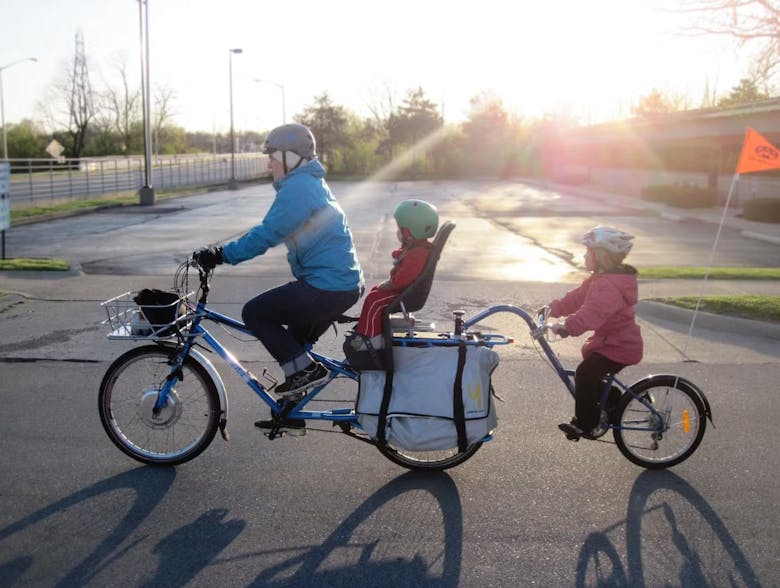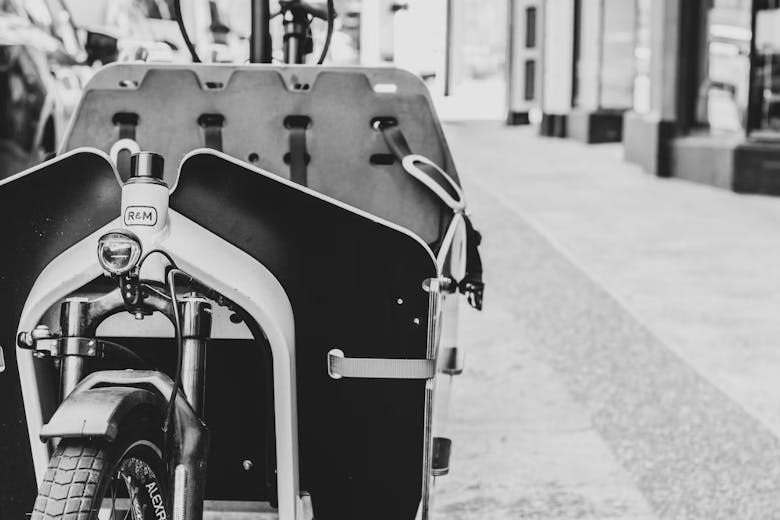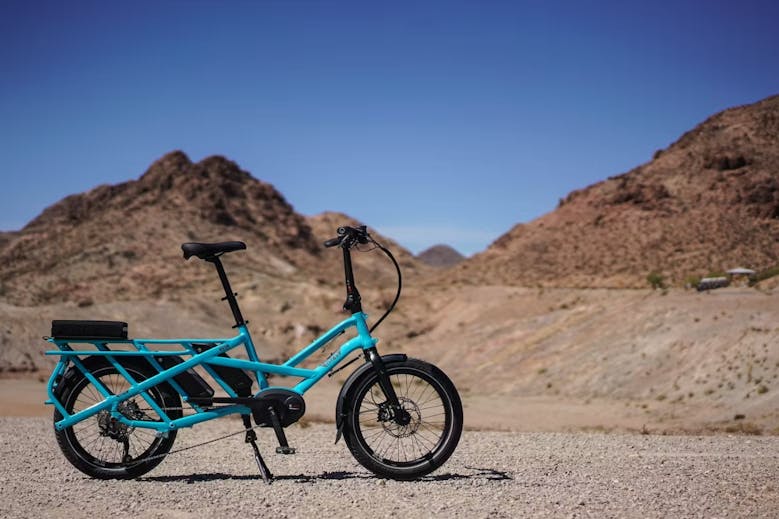Home / Our mission / Blog / Why use a cargo bike and which one to choose?
Why use a cargo bike and which one to choose?
30/11/2023

Let's start by revisiting what exactly a cargo bike is before detailing its potential uses and benefits. The cargo bike is THE ultimate transport bike! It can carry multiple young children, one or more pets, your groceries, or any other heavy load. Whether you're a worker, a casual or avid cyclist, a parent, or simply someone eager to change their mode of transportation, the cargo bike can become your best friend.
Why use a cargo bike?

The daily use of a cargo bike can be motivated by various reasons, offering numerous ecological and economic advantages. Here is a non-exhaustive list of motivations that might prompt you to use a cargo bike for all your commutes and replace your car!
Cargo Bike for Heavy Loads
First and foremost, the cargo bike is designed to transport heavy and/or bulky loads (children, large grocery hauls, dogs, etc.). It can be particularly useful in various daily situations: taking your children to school, commuting for work (for dedicated bike commuters: daily home-to-work commutes), moving small furniture and boxes, or doing your significant weekly grocery shopping. The cargo bike is the versatile mode of transport to prioritize, especially in urban environments!
Cargo Bike as an Economic Mode of Transport
The cargo bike is an economic alternative to "traditional" modes of transport such as cars, vans, or even public transportation. Once the initial investment is made, it requires no fuel and generates very low maintenance costs!
Moreover, there's no need to pay monthly subscriptions for public transportation, whose prices can quickly rise and are constantly increasing in major cities. The cargo bike is one of the most economical modes of transport once the purchase is made. Although the price may be a barrier for many users, it will quickly be offset by its frequency of use and practicality.
Finally, many two-wheel rental companies offer cargo bikes for use. This allows you to test its usability before making a definitive purchase.
Cargo Bike as an Ecological and Healthier Alternative
Yes, the cargo bike is primarily an ecological alternative for the majority of your daily urban commutes! The cargo bike produces no polluting emissions, unlike individual vehicles often used for daily or professional commutes.
Furthermore, the use of cargo bikes helps reduce traffic congestion in urban areas and decongest roads and highways, significantly impacting pollutant emissions in urban environments, as well as traffic flow.
Beyond its significant ecological aspect, biking every day is an excellent way to get exercise effortlessly while completing a daily commute. It is scientifically proven that engaging in daily physical activity improves both physical and mental health.
Indeed, home-to-work commutes can become a decompression chamber between the office and home, a way to refresh both body and mind for a healthier life. And let's not neglect the psychological impact of spending part of the day outdoors, rather than being stuck in a crowded subway or bus. If you plan to park your bike on the public road, check out our article on 7 effective tips to protect your bike from theft.
In summary, the cargo bike is the most economical, ecological, versatile, healthy, and family-friendly urban transportation method for facilitated daily commutes.
Prioritizing safety with a cargo bike

The cargo bike is an ideal and preferred mode of transportation for families, especially those living in urban areas. Cargo bikes are designed so that parents can pedal safely while carrying their children in the dedicated front box. Safety is paramount when using a cargo bike with the family. It is recommended to follow several basic rules to ensure the safety of the entire family during your commutes.
To protect your children during bike cargo transport, avoid them standing up or fidgeting while riding to prevent tipping of the box or other accidents. We recommend using individual seat belts to keep the child in a seated position. This will prevent your children from bumping in case of sudden stops or collisions.
Seat belts are provided by most brands that distribute cargo bikes, prioritizing user safety. Additionally, we strongly recommend wearing helmets for all family members using the cargo bike.
When using your cargo bike, prefer using designated bike lanes. If they are not available, ride on the right side of the road to remain visible. You can also opt for reflective bands to maximize visibility as daylight declines. Finally, similar to driving a car, maintain a safe distance of several meters from other vehicles to anticipate any danger or unexpected change in direction.
The Geovelo app allows you to calculate and choose secure routes, specially adapted for cargo bikes, for all your commutes. One of the criteria taken into account is, for example, the absence of anti-scooter barriers, which also prevent cargo bikes from using certain paths.
To calculate a cargo bike route from the Geovelo app:
- Enter the starting and destination addresses.
- Choose the type of bike you want (in this case, the cargo bike).
Note: Feel free to report missing paths, the type of surface (grass, dirt, wide path, etc.) through the reporting feature. Our team of cartographers will take care of adding them.
Which cargo bike to choose?

Biporter vs. Triporter: A Broad Question!
Choosing between a biporter (2 wheels) and a triporter (3 wheels) is a significant decision. The differences in sensations and behavior between the two types of cargo bikes are numerous.
We recommend test rides with both types of cargo bikes before making a decision. This way, you can become familiar with both styles of riding and identify which one suits you best. The triporter offers stability, especially when carrying heavy loads, while the biporter is generally more maneuverable.
You can also choose between an electric or non-electric biporter and triporter.
Cargo bike vs. extended bike: Which one to choose?
If you have two children or fewer, the extended bike can be an interesting option compared to the cargo bike. The extended bike's advantage lies in its maneuverability and ability to navigate through tight spaces, which can be challenging for a bulkier cargo bike. The extended bike is also easier to park in confined spaces, essentially being a longer traditional bike.
As explained earlier, the cargo bike has a front bin, making it more imposing with a greater carrying capacity and versatility.
Buying a used cargo bike?
Despite its numerous advantages, a cargo bike can be quite expensive, requiring careful consideration before purchase. Buying a cargo bike is not a decision to be made on a whim. We recommend comparing brands and options before making a decision.
Often, for a first purchase, considering a used cargo bike can be more economical (and ecological). Many used cargo bikes, electric or non-electric, are available on resale websites between individuals, such as Leboncoin.
When buying used, keep in mind that you won't have the same services as with a new purchase: home delivery, warranty over several years, equipment, and options, etc.
Should You Prefer an Electric Cargo Bike?
The electric cargo bike is THE versatile and family-friendly electric bike par excellence! Electric bikes make it possible to transport heavy loads. However, a common question before purchasing is: Do I need electric assistance, or will my muscles suffice?
The possibilities are varied, and the necessity of assistance depends on how you plan to use your cargo bike. If you intend to carry heavy loads and fully utilize the cargo capacity, you might consider opting for an electric cargo bike. Note that this raises the question of autonomy constraints (remember to recharge your battery!).
Choosing a non-electric cargo bike is primarily interesting for budgetary reasons. The absence of a motor/battery helps reduce the purchase cost of your bike. If you live in a region with few or no hills, this can indeed be the preferred option! The non-electric bike can also be a choice based on ecological convictions.
Opting for an electric cargo bike also means prioritizing a certain level of comfort and increased frequency of use. If you choose the cargo bike as a replacement for your car, electric assistance allows you to use it for all your travels, which might be less feasible with a non-electric cargo bike. Electric assistance remains a real comfort for the user, enhancing the cargo bike's versatility.
You might also be interested in these articles...
Browse all articles
Ecotourism: environmentally-friendly vacations
Discover the fundamental principles of ecotourism and various ways to apply them during your travels.

Can you ride a bike while pregnant?
Can you practice cycling while pregnant? What precautions should you take when cycling during pregnancy?

Bike trip: essential equipment for a worry-free journey
Our advice on essential equipment for your bike trip !